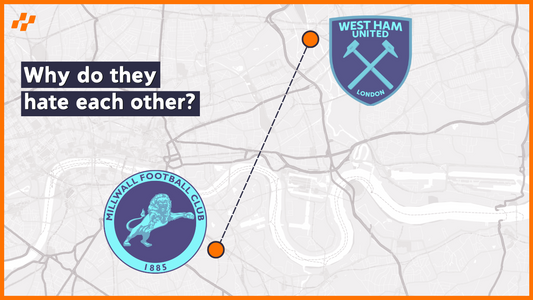
How Manchester City Broke Financial Rules in 1905
Share
Manchester City has come under intense scrutiny from UEFA for failing to comply with Financial Fair Play rules, for giving false accounts about how much money they had received through their sponsorship with ETIHAD Airways. The Premier League has now charged them with around 100 alleged breaches of financial fair play rules over a nine-year period.
However, this is not the first time in Man City's history that there has been controversy and scandal. Going all the way back to 1905, when an investigation into the club about illegal payments to their players was conducted, the consequences would be devastating and almost led to the club ceasing to exist altogether.
In this article, we look back to 1905 and the FA investigation to when Man City first broke the financial rules.
Watch the video on our YouTube channel here
How it started
The FA was suspicious of Manchester City almost immediately after they won promotion to the First Division for the first time in their history in 1899, because the club was backed by wealthy directors who offered the players generous wages compared to the standards of the time in a desperate attempt to reach the top of the English game.
Despite their lavish spending, the team struggled to gel together. Worse, the FA implemented the maximum wage policy in 1901, capping player wages across all clubs at £4 per week and making bonuses illegal.
This meant that many of City's players' weekly wages would be significantly reduced, putting the club's bold financial strategy in jeopardy. They were relegated in 1902 after struggling on the field, but they quickly recovered by winning the Second Division title in 1903.
The following campaign would see them finish second in the First Division and win the first major trophy in their history, against Bolton in the 1904 FA Cup Final.
Man City were despised by the authorities, who saw them as nothing more than a wealthy club that bought their way to success and lacked the historical status of teams like Everton and Preston North End. As such, the FA were suspicious of City’s financial operations and conducted their first investigation into the club in 1904.
Although they didn’t uncover too much, they did find out that there had been irregularities regarding the transfers of two players from Glossop North End.
The punishment was a £250 fine, the closure of their stadium Hyde Road for two weeks, and the temporary suspension of five directors - but the FA suspected that there was more to the story than met the eye.
1905 Scandal
The pivotal moment in the FA’s decision to investigate City again was in the aftermath of the match between City and Aston Villa, which was the final game of the 1904-05 season. Billy Meredith had played for Manchester City since 1894 and was the key part in the 1905 scandal.
City needed a win to stand any chance of overtaking Newcastle at the top of the table, but the game was violent, with Villa captain Alec Leake on the receiving end of many hefty tackles, as well as a couple of punches thrown by City’s Sandy Turnbull.
City lost the game 3-2, and Newcastle secured the First Division title. The FA weren’t impressed and banned Turnbull, as well as the referees from that game and their previous match against Everton – another violent affair – for a month each following an inquiry into the Aston Villa encounter.
However, upon hearing evidence from an unnamed source, it turned out that City’s players were furious at Leake as he had refused to take a bribe of £10 that Billy Meredith had offered him beforehand to throw the game.
Once the FA realised this, they immediately banned Meredith, who protested his innocence. Although no evidence was taken from Meredith, he was suspended for one year and fined.
That was something the Welshman did not agree with at all, and after he begged for his employers to pay him on numerous occasions, the FA forced City to report him. This was a tactic by the FA to get him to speak about how City operated financially, and whether or not they had broken the rules. It worked.
Outraged by the club reporting him, Meredith would expose all of City’s illegal financial workings.
He revealed that his wages before they were suspended were £6 per week, £2 more than the maximum wage, same for other players, and that if he had engaged in match-fixing for the Aston Villa game, it would have been on the orders of Club Secretary Tom Maley rather than of his own volition.
Other revelations included the fact that some of the club's gate money went directly to the club's directors rather than the club itself, which was then used to pay the players' bonuses, and that they had handed out just over £681 in bonuses to their squad during their successful 1903-04 season alone. Which was all very illegal.
The FA now had full reason to inflict severe punishments on City, and there was a very real possibility that the club could be shut down completely, but eventually, they decided that fines and suspensions would suffice instead of liquidation.
Aftermath
As a result of the scandal at Man City, the club was forced to pay £900. 17 players were fined individually and were suspended until New Year's Day 1907. The FA also forced City to auction off all of their players at the Queen's Hotel in Manchester.
Manchester United's manager, Ernest Mangnall, bought up many of the most talented players, including Billy Meredith, Herbert Burgess, Sandy Turnbull, and Jimmy Bannister. In fact, Meredith moved to Manchester United while still banned in May 1906, and he quickly became the heart of the United team, which went on to win the 1907-08 title.
City's antics were most likely not isolated, and many other clubs were probably doing similar things to them, but after one ill-fated game against Aston Villa, they were the ones who had to bear the burden and serve as a reminder that no team is infallible.





